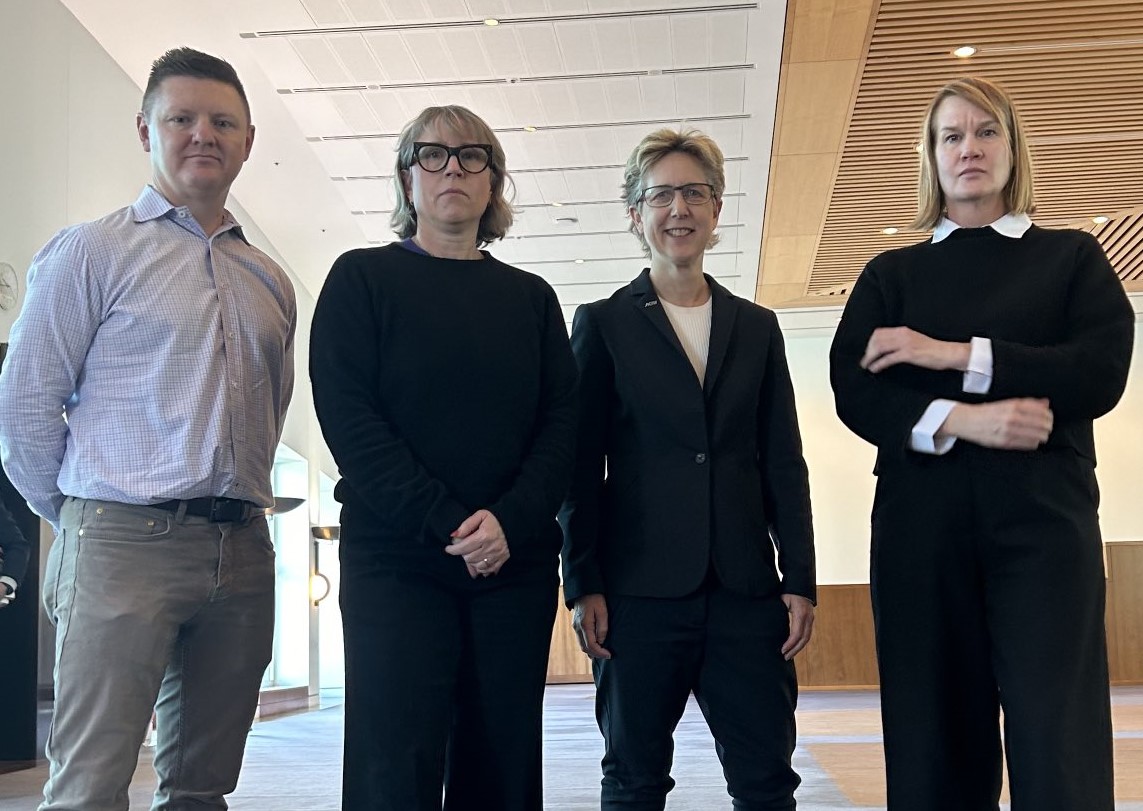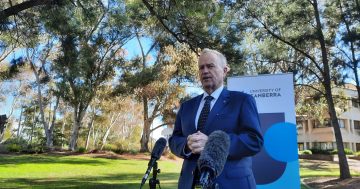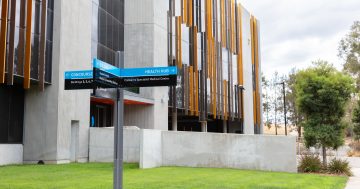
NTEU ACT secretary Dr Lachlan Clohesy with (from left) Victorian secretary Sarah Roberts, Australian Council of Trade Unions secretary Sally McManus and NTEU president Dr Alison Barnes, who all came to Parliament to call for an inquiry. Photo: @AlisonBarnes25.
As university wage theft is on track to exceed $382 million this year, the National Tertiary Education Union (NTEU) has said enough is enough.
The NTEU has called for an “urgent” federal parliamentary inquiry following the release of new data confirming underpayments to university staff now total more than $203 million in recent years.
Types of verified underpayment commonly found in Australian universities include failure to pay penalty rates, failure to pay appropriate rates (by work classification), failure to pay for minimum shift durations, not correctly paying for marking, and withholding payment of full superannuation amounts.
Universities’ annual reports reveal a further $168 million has been set aside to repay workers for suspected wage theft incidents. The union estimates there is a further $10 million across three universities, which are refusing to reveal the full extent of their underpayments.
NTEU president Dr Alison Barnes said wage theft at Australian public universities had spiralled beyond a crisis into a national disgrace and staff were “rightly furious”.
“Australian taxpayers are being taken for a ride by unaccountable vice-chancellors and senior executives committing wage theft at proportions that would make the private sector blush,” Dr Barnes said.
“Vice-chancellors and senior executives must be held to account for the industrial-scale wage theft that has become the shameful hallmark of Australian universities.
“University staff will not accept any more empty platitudes – it’s time for vice-chancellors to finally face proper scrutiny for this awful behaviour.
“We’re calling on all political parties to back an urgent parliamentary inquiry into out-of-control university wage theft.”
The NTEU analysed 62 separate incidents of wage theft across 30 public universities in which a dollar amount has been confirmed, and three additional institutions that have confirmed underpayments were made but have not revealed the extent of these incidents.
The vast majority of these underpayments have occurred since 2014, with the earliest starting in 2009.
At least 131,471 individual higher education staff have been underpaid by their employers. A further four wage theft cases are not included in the total as they are yet to be finalised.

While some universities have self-reported to the Fair Work Ombudsman, others have fought against wage theft claims.
The NTEU said these claims were worth millions of additional dollars, meaning the true higher education wage theft tally could reach $400 million this year. Many universities have also not had external third parties undertake full forensic audits of their historical payrolls, such that the union believes significant underpayments are likely yet to be uncovered.
Greens deputy leader and higher education spokesperson Senator Mehreen Faruqi agreed with the union and said it was time for the government to fix its “broken business model of the neoliberal university that only works off the back of casual and underpaid staff”.
“Sadly, the NTEU’s findings are no shock to any of us,” Senator Faruqi said. “Wage theft in universities is a systemic scourge that is harming staff across the country.
“The fact that we have a university system where vice-chancellors earn salaries exceeding $1 million a year while casual staff are robbed of hundreds of millions of dollars is obscene.”
Senator Faruqi said “immediate and decisive action” must be taken by the government to require universities to set publicly available targets for increasing permanent employment, along with clearer reporting requirements on employment statistics and improved rights of entry for trade unions.
“Critically, the government must significantly increase funding for universities and overhaul university governance to shift the balance of power from university management back to staff and students,” she said.










